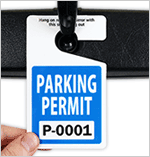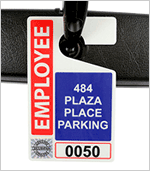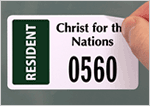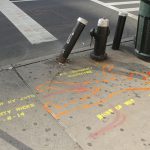Abuse of disabled parking placards leads to legislation in Tennessee

A hotel parking lot in Nashville. Courtesy Flickr’s Lucy Orlosky.
An investigation by a news team in Nashville has fueled discussion around legislation for disability parking placards. “What you’ve captured here on video, there’s clear abuses in the system,” state representative Darren Jernigan, D-Old Hickory, told the Channel 4 I-Team. “It’s got to stop.”
Prompted by email complaints from viewers, the team began looking into handicapped placard abuse in the city’s downtown late last month. The team uncovered what seemed to be fraud on a daily basis as drivers sporting the familiar blue disability hangtags from rear-view mirrors parked for hours at metered spots along Nashville’s main streets yet “appear to be able-bodied,” said Chip Knauf, a traffic engineer with Metro Traffic and Parking, when he was shown video taken by the undercover news group.
Time and time again, the team caught drivers with disability parking placards leaving their vehicles, climbing stairs, carrying bags, and walking for several minutes in below freezing weather to their destinations. None used walkers or wheelchairs.
Under state law, disabled motorists receive free, metered parking, providing incentive for cheaters to game a system with few safeguards for fraud, such as the inability of enforcement officials and the public alike to tell who is lawfully disabled. “There are people with invisible disabilities, be it a heart condition or asthma,” said Jernigan, who has C 5-6 quadriplegia and uses a wheelchair.
Added Emily Hoskins, an independent living specialist with the Center for Independent Living in Nashville, “A police officer can’t walk up to that person and say, ‘Excuse me, what’s your disability?’ You can’t require people to disclose their disability.”
Compounding the issue are procedural weaknesses. To receive a placard, for instance, motorists must provide a signed note from a medical professional certifying to the disability, but renewals, which are required just every two years, can be by mail and require no such note. It’s even possible that applicants could renew placards for relatives who have passed away.
In addition, the office of the county clerk, which, along with the Tennessee Department of Revenue, is in charge of issuing the placards, doesn’t verify applicants’ disabilities with physicians. When asked why, Davidson County Clerk Brenda Wynn said, “I think that might violate HIPA laws.”
Fraudulent users of disability parking placards are a concern for local governments because of the economic drain they cause: lost parking revenue and the lack of turnover parking for businesses, such as restaurants and shops.
“The short-term user who wants to come in there and go shopping or have lunch can no longer do that without going to a surface lot where they have to pay four times the amount they would normally have to pay,” said Knauf, but the “number one concern over and above revenue—and even over and above turnover parking—it’s the person that really needs that spot who is not able to park there.”
Jernigan is at work with state senator Mark Green, R-Clarksville, on legislation that addresses these abuses. The duo has teamed up with the Disability Law and Advocacy Center of Tennessee to fine-tune the regulations and to recommend amendments to existing legislation. The nonprofit Tennessee Disability Coalition is also looking into the findings of the Channel 4 I-Team.
Related Posts
Category: Enforcement, Municipal, Parking, Parking management






















